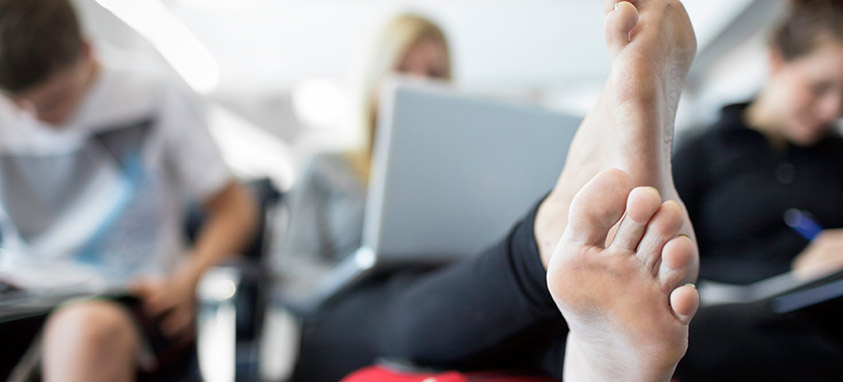If you know me at all, you won’t be surprised to learn that I decided to read an article in the New York Times entitled “Whose Feet Are Those?” Unfortunately, it wasn’t a story about a mysterious rash of stray feet showing up in unexpected locations. Instead, it was about travel etiquette. It even quoted the book Etiquette by Emily Post, which has been torturing the world for almost a century.
Post’s basic advice? Don’t do anything at all, ever. Or, to quote her directly, “…to do nothing that can either annoy or offend the sensibilities of others, sums up the principal rules for conduct under all circumstance—whether staying at home or traveling.”
Keep in mind that this was written in 1922, at a time when things such as “unescorted women in public” and “racial equality” would have offended the sensibilities of at least a few people. That Post herself was literate and well-educated was probably an indelicate subject of conversation at some dinner tables. And hadn’t women just irritated a whole bunch of menfolk by winning the right to vote? But I’m getting off track.
Or am I? After all, old advice is often the best advice. So in honor of Ms. Post and her fervent desire to never do anything that might in any way bother another human being—and also in honor of the thousands of human beings who are apparently so easily bothered that an article like “Whose Feet Are Those?” needed to be written— here are a few travel tips I hope you take to heart:

Use only soaps, deodorants and perfumes that every passenger on your flight will appreciate. This will require you to learn the names of all these people, call them and obtain their verbal approval before leaving your house.
As Lizzie Post, Emily Post’s great-great-granddaughter and keeper of modern etiquette, says, “Even the lightest perfumes can actually be amplified, especially when you’re in travel situations. Stress levels are elevated, and when that happens you do tend to perspire more.” Which also means you shouldn’t sweat. If you sweat, you should get off the plane, even if this requires a mid-flight departure. Remember, your seat can be used as a life preserver, which means it’s probably also a parachute.
Don’t get on the plane until forcibly escorted to your seat by airport security. The article quotes one frequent flier’s frustration at “gate lice,” referring to people who stand around the gate and wait to board long before their zone is called. Right now we’re going to ignore the fact that first-class passengers have done this on every one of the hundreds of flights I’ve been on—in fact, they’re usually so good at it that they actually block traffic in the main lanes from one gate to the next. They are first-class lice, and therefore exempt from your contempt.
The main point here is that standing and waiting has the potential to annoy others, so you shouldn’t do those things. Good little boys and girls should be seen and not heard, and good little airline passengers should be seated at all times—including outside of the plane.
Don’t recline your seat, use your armrest, accidentally bump the seat in front of you or stretch. Every one of these activities was cited in the article as a potential source of friction between passengers, which means none of these activities are acceptable.
Other social faux pas include yawning; speaking at a volume everyone else can hear; wearing a brand of headphones disapproved of by other passengers; having to go to the bathroom when you’re sitting in a window seat; breathing too heavily; coughing; looking sideways; wearing clothing other passengers don’t like; and being vaguely or acutely unattractive.
And there you go! Simply follow my impossible-to-implement advice, and you’ll be the unobtrusive life of every public conveyance in which you set foot. The people around you probably won’t thank you because you’ll be so invisible that they probably won’t even notice you—but at least they won’t hate you.
Jeff Havens is a professional development expert who addresses leadership, generational issues and other topics through a unique blend of content and entertainment. jeffhavens.com
Don’t Annoy to Get Ahead
Doing nothing to annoy, to paraphrase Emily Post, is also excellent advice for your career:
-Do exactly as you are told.
-Keep your mouth shut.
-Refrain from offering any opinion with which others might
disagree.
-Defer to others in every contentious situation.
-Avoid any activity that has the potential to “make waves.”
Soon you’ll be the kind of well-regarded person that nobody ever thinks to promote—because you won’t be thought about at all. (This is a joke, people!)




